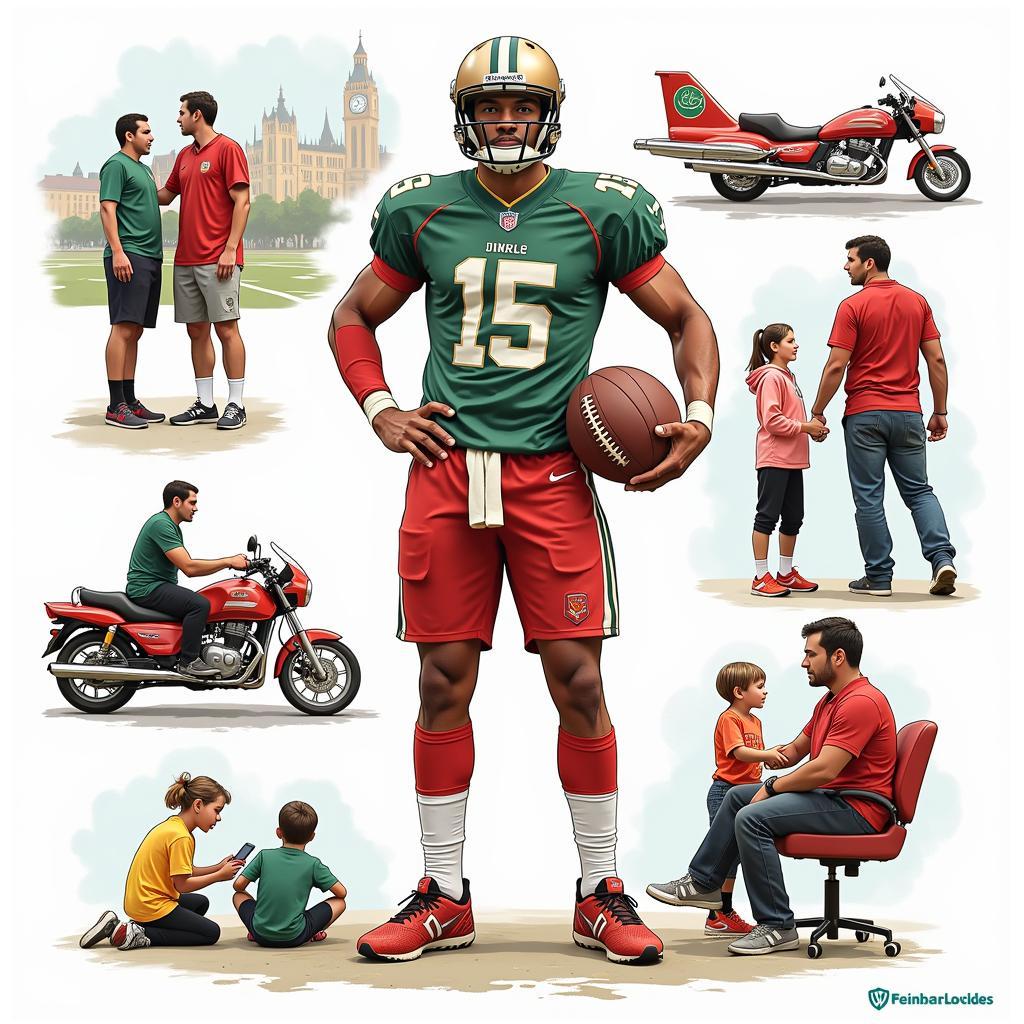The life of a professional footballer is often shrouded in glamour and intrigue. Fans marvel at their skills on the pitch, but what about their lives off it? One question that frequently arises is: Do football players actually reside in the cities they represent?
 The Life of a Football Player
The Life of a Football Player
The answer, as with many things in life, is not always straightforward. While some players choose to immerse themselves in the local culture and establish roots in their team’s city, others opt for a more detached approach, maintaining residences elsewhere for personal or familial reasons.
Factors Influencing a Player’s Living Situation
Several factors come into play when a player decides where to live during their tenure with a club.
Family Ties and Personal Preferences
For players with spouses and children, family considerations often take precedence. The availability of suitable schools, proximity to extended family, and the overall quality of life for their loved ones can significantly influence their choice of residence. Some players may have deep-rooted connections to their hometown or previous cities where they’ve lived, making it challenging to relocate permanently.
Contract Length and Future Plans
The duration of a player’s contract also plays a role. Short-term contracts may discourage players from uprooting their lives, leading them to opt for temporary accommodation or commute from a nearby city. Conversely, players with long-term contracts are more likely to invest in property and establish a permanent base in the team’s city.
Lifestyle and Cultural Compatibility
The city’s lifestyle and cultural offerings can be enticing or deterring factors. Players accustomed to a bustling urban environment might find solace in cities like London or Madrid, while those who prefer a more laid-back atmosphere might gravitate towards smaller, quieter towns.
The Benefits of Living Locally
Players who choose to live in the city they represent often cite numerous advantages.
Enhanced Connection with Fans and Community
Living locally allows players to interact with fans on a more personal level. Whether it’s bumping into them at the local café or participating in community events, these interactions foster a sense of belonging and mutual respect.
Deeper Understanding of Club Culture
Immersing oneself in the city’s fabric allows players to develop a deeper understanding of the club’s history, traditions, and values. This connection can translate into a stronger sense of loyalty and commitment on the pitch.
Challenges of Living Away from Home
While living locally has its perks, players who maintain residences elsewhere also face unique challenges.
Maintaining Relationships and Social Connections
Frequent travel and demanding schedules can strain relationships with family and friends who live far away. Players need to make a conscious effort to nurture these connections through regular communication and visits.
Managing Logistics and Travel Demands
Juggling multiple residences and navigating travel logistics can be taxing. Players need to be organized and efficient with their time management to balance their professional and personal lives.
Conclusion
Ultimately, the decision of where to live is a personal one for each football player. While some embrace the opportunity to become part of their team’s city, others prioritize different aspects of their lives. Regardless of their choice, the dedication and passion they display on the field remain a testament to their professionalism and commitment to the sport.
FAQs
1. Do all football players receive housing allowances?
While some clubs provide housing allowances or team-arranged accommodations, this is not a universal practice. Contract terms and individual player negotiations often determine housing arrangements.
2. Are players required to live within a certain radius of the team’s training ground?
There are typically no strict rules regarding proximity to training facilities, but players are expected to arrive on time for training sessions and matches, regardless of their living arrangements.
3. Do players face any restrictions on their personal lives when living in the team’s city?
Players are expected to maintain a professional image and adhere to club codes of conduct. However, they are generally free to enjoy their personal lives within reasonable bounds.
4. Can players invest in businesses or properties in the city they play for?
Yes, players are free to pursue personal investments and business ventures, subject to any relevant legal and financial regulations.
5. Do players maintain relationships with former teammates who have moved on to other clubs?
The close bonds forged in professional football often extend beyond a player’s tenure with a particular club. Many players maintain friendships and connections with former teammates throughout their careers.
Need More Information?
For any inquiries or assistance, please contact us at:
Phone Number: 0869066600
Email: [email protected]
Address: 491 Đ. An Dương Vương, P, Bình Tân, Hồ Chí Minh 71907, Việt Nam.
Our dedicated customer support team is available 24/7 to assist you.